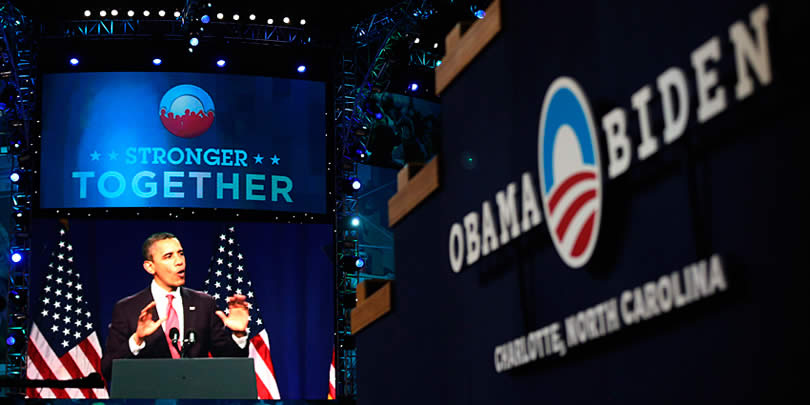
2012 Democratoc National Convention, September 4-6, Charlotte, NC
by Y-Press
Meet the reporters |
Audio slideshow: Vendors at the DNC |
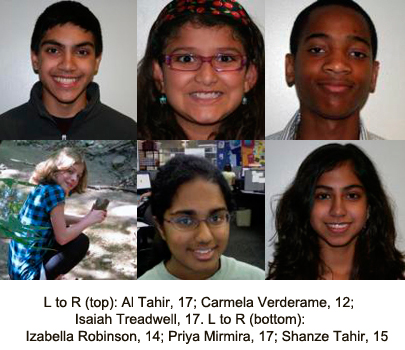 |
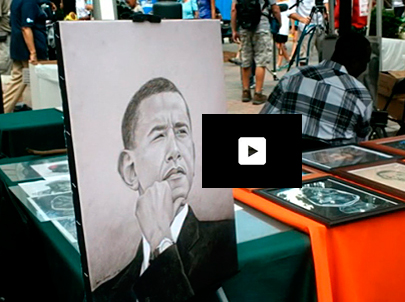 |
Radio interview
What impact will social media have on this election? To find out, Y-Press journalist Isaiah Treadwell visited the Digital Campaign and Social Media's Impact Conference in Charlotte, during the Democratic National Convention. He attended a panel discussion featuring the Obama campaign's chief digital strategist, Joe Rospars, and representatives from Facebook, Twitter, and Google.
Reporters' notebooks (9)
Opening night
by Isaiah Treadwell, 17
I confess: I am not a political junkie. While I enjoyed doing my research for our trip to the Democratic National Convention, I usually just follow political events during the conventions, and then only read the headlines or photo captions of stories. However, the opening night of the 2012 Democratic National Convention was one of the most memorable nights of my life.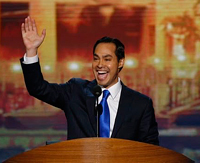
I was fired up from start to finish. The performance by R&B artist Ledisi had the whole crowd rushing out of their seats to dance, though as media, I could only stand there and tap my feet. have fun, and sing along. After some speakers, the night continued with Kal Penn, associate director in the White House Office of Public Engagement, or Kumar, as you may know him "Harold and Kumar" movies. When he began his speech by thanking everyone for nominating him president, the crowd roared (I just smiled.)
The audience grew quiet when a video appeared telling the story of Stacey Lihn, a mother of a toddler with congenital heart disease who credited Obama's health care plan for allowing her to afford treatment for her daughter Zoe. Then the Lihn family took the stage. Lihn explained that without the re-election of the president, she fears she won't be able to pay for Zoe's operation next year. When she started to cry, I truly felt her pain (though I remained silent).
Julian Castro was next. The mayor of San Antonio whipped up enthusiasm with his praise of President Obama and his hopes for a stronger economy with the help of the federal government. His speech was powerful and moving, and he left me pumped up for the appearance of Michelle Obama.
When the first lady took the stage, everyone was on their feet (including me). The ensuing roar encompassed the arena, and hundreds of "We Love Michelle" signs appeared. When she started speaking, the crowd calmed down and seemed to focus on her every word. I know I did. I was especially moved by her reference to herself as mom-in-chief. Mom-in-chief is a great word to explain our first lady. Every time I have seen her, she is smiling and attentive. But even more than that, she exudes a calm that relaxes those around her.
I felt that calm Tuesday night. I zoned out of the convention chaos. For a few minutes, it was just mom and me.
United in Diversity
by Ali Tahir, 17
In the U.S. Census conducted in 2010, America realized that two of its largest states, California and Texas, were minority-majority states, meaning that no single demographic group comprises more than 50 percent of the population. Experts using this data estimate that by 2020, the entire U.S. population will be minority-majority. 
This trend came to life Wednesday in a discussion hosted by the National Journal. Titled "Conversations with the Next Generation," speakers included Kal Penn, also known as Kumar in the "Harold and Kumar" films; America Ferrera, actress known for her role in Ugly Betty; Viola Davis, Academy-Award-nominated actress for The Help, and Michelle Rhee, CEO and founder of StudentsFirst, an education reform organization. Chelsea Clinton, among others, asked the questions.
For the audience, the visual was Indian-American, Latino-American, African-American, Asian-American, Caucasian-American.
This diverse panel then discussed Generation Y, generally regarded as Americans born from the mid-1970s to 2000, and the impact it will have on the future of America. The point was made that Caucasians will not make up a majority of the population by 2020, and looking at the panel, it appeared that this demographic is already here.
As a Pakistani-American, I welcome this increasingly diverse trend. A multicultural America excites me. I have heard that the larger the volume of minorities, the larger the volume of discourse. I can't help but feel this diversity will ultimately benefit America by enlarging discussions both foreign and domestic.
Some might say that a more diverse America means a more divided America—that all these multinationals will have allegiances to countries besides the U.S, and thus are not true Americans.
But I feel that Americans are not defined by how they match up to some visual stereotype, but rather if they share some common beliefs, such as love of country and faith in democracy. Some even say that people who come to the U.S. often have more appreciation and patriotism than those who are born here. I am confident that this new true melting pot will ultimately help America on its path to establish a more perfect union.
Youth Want More
by Ali Tahir, 17
This year, many Democratic Party strategists are concerned about the youth vote. They know that without the support of young people, another Obama victory would be in jeopardy. To that end they have tried to find innovative and fun ways to recharge the vote, from concerts by rapper Trey Songz to the 9-3-1 initiative (a donation of nine hours of volunteer work for the Obama re-election campaign in North Carolina, over three shifts, equaling one ticket to the president’s acceptance speech on Thursday).
Unfortunately, many of the youth themselves want more for their vote—they want more concrete reforms.
This was the overall vibe at the Youth Council meeting at the DNC on Monday. In the crowd of about 300,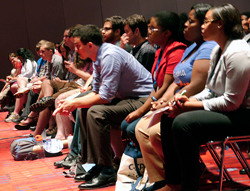 half were young adults, in their 20s or younger. A surprising few—about 20—were true youth, in their teens.
half were young adults, in their 20s or younger. A surprising few—about 20—were true youth, in their teens.
Many of the speakers talked about recharging the youth vote, exhorting the crowd to make one extra phone call or knock on one more door. It was clear the speakers, such as Debbie Wasserman Schultz, U.S. representative from Florida, and Buffy Wicks, deputy director of the White House Office of Public Engagement, felt an urgency to win over the youth, with many of them saying that young people are the key to winning this year’s election.
A few of the youth interviewed in the audience, however, want more. While many said they were impressed with the speakers, they want to be promised sustainable change – especially with regard to education reforms—if Obama is to be re-elected in 2012.
“I’d love to see him redo it, where it be … more one-on-one interaction and less about this one test that teachers teach to and get paid (for their results),” said Brenden Carol, 17, from Charlotte.
This feeling was shared by other youth at the meeting. Brenden and his friends discussed their charges to the Obama administration, such as improving conditions for schoolchildren as well as granting more federal aid and Pell grants for college students. In particular, one mentioned trying a more peer-based learning style.
“I think the best way to tackle the education process is to get students like myself involved in teaching other students. I think peer-to-peer tutoring will be best to tackle the education process,” said Damian Walker, 16, also of Charlotte.
While no one doubts that the youth vote will be pivotal in the election, their votes might not be as easy a sell for Obama as they were in 2008. New initiatives and techniques are being brought out and tried every day, but it seems that the real challenge this year will be convincing the youth that more desirable change will happen in the next four years and getting them engaged. Teenagers and young people are smarter this election, and if the Democrats or Republicans want to get this fought-over demographic, then one of them will need to convince young people that reforms lay ahead.
Ms. Obama
by Priya Mirmira, 15
n 2008, Hillary Clinton was my choice for president. I loved her spirit, strength and passion. When Clinton did not receive the nomination for president, I was disappointed. However, I admired Barack Obama and was sure he would make a good president.
During his term, I found that it was not him that I truly admired. As the saying goes, behind every strong man, there is a strong woman. 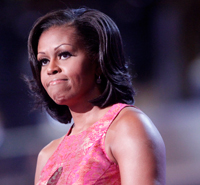
The first lady, in many ways to me, is like Hillary Clinton. She has the same spirit, passion and strength. Michelle Obama quickly rose to the top of my role model list. She has the ability to make a difference in the world, not just because she is the first lady, but because she is hard working and determined.
Hearing her speak at the Democratic convention Tuesday was empowering. The love and support she has for the United States as well as her husband is tangible. She did not have to say it outright—you could hear it in the tone of her voice.
One line really stood out for me: "Change is hard, change is slow and it never happens all at once. But we eventually get there, we always do." As a young woman facing her own challenges, there have been many times where I have had to change. For example, I did not attend Zionsville High School with my friends from middle school. Instead, I moved to a private school. My first semester was rough; it took me a while to make friends. However, I eventually did, though it was not always easy, and it didn't happen right away.
It's encouraging to see that Mrs. Obama also has had to adapt to changing circumstances. She didn't merely have to wrestle with changing schools—she had to leave a comfortable life in Chicago for a very public one in the White House. I can only imagine how tough that change must have been for her, having to share her husband with the world. Yet, she continues to handle it gracefully and cheerfully.
Tuesday's speech was a reminder to me about the importance of strength and determination, especially when times look grim. I left the area left feeling recharged and ready to take on the world.
President Obama
by Priya Mirmira, 15
Thousands of people were disappointed when the DNC had to move President Obama’s speech from the large 74,000-seat outdoor stadium to an indoor area about one-fourth that size. Y-Press had four credentials,  and I realized how fortunate we were to be able to attend when so many campaign volunteers had been shut out.
and I realized how fortunate we were to be able to attend when so many campaign volunteers had been shut out.
So when it started to pour as we were making our way to the convention hall, I didn’t feel I had a right to complain. I was so thrilled to be there that I didn’t even mind sitting in soaking-wet clothes for the next seven hours. The excitement of the evening made me forget my discomfort.
At 10:30 p.m., the president finally walked onstage. The entire arena detonated into an ear-piercing cheer. We were so caught in the moment that my fellow Y-Pressers and I could not help but stand up and clap too.
It took several minutes for the arena to fully settle down and the president to begin his speech. As always, he spoke powerfully and eloquently, but one line really stood out to me: “As I stand here tonight, I have never been more hopeful about America.”
This optimism stood out in sharp contrast to all of the useless, ad-hominem political attacks I’ve heard this year. Both presidential candidates have questioned the other’s fortitude and vision for our country. But in that moment, I saw that each of them cares deeply about the future of the U.S. and sincerely believes in his ability to make things better for all Americans.
President Obama has shown over four years that he does care about our country through both his words and his actions. If he did not care, I do not think he would be running for re-election. But I also feel the same way about Mitt Romney. Though I disagree with some of his proposals for tackling many of the problems of this country, I don’t for a minute question his loyalty and concern for America.
Both candidates have different visions for America, different ways to move us forward. But one thing that they share is a common cause— serving the country that they both love and respect.
Hispanic Caucus
by Priya Mirmira, 15
On Monday, U.S. Rep. Debbie Wasserman Schultz (D-FL) addressed the Hispanic Caucus in the Charlotte Convention Center. 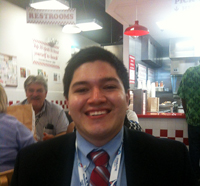
"Under Mitt Romney, we might as well say, 'You are on your own.' Well, Barack Obama says, 'No you're not.' He has your back and we need to have his!" she said.
An exuberant cheer arose from the Latino crowd, followed by a standing ovation. I was awed by the sincere enthusiasm and passion of both the audience and the speakers.
During this caucus, the speakers highlighted two main concerns that Hispanics had for the upcoming election: health care (ObamaCare) and education (namely the DREAM Act/executive order). However, they were mostly concerned about education.
So is George Hornedo, 21, a DNC page appointed by the Indiana Democratic Party chairman. Hornedo said education is the most important issue to the Hispanic community. "When you look at the numbers, 16 percent of the total U.S. population is Latino. By 2050, the total U.S. population will be 29 percent Latino," he said. However, the Latino population has a much lower high school graduation rate compared to other youth," he said. "What does that mean when the fastest-growing minority group is graduating at an extremely low level? That's not a good sign."
Government education statistics largely corroborate Hornedo's statistics. But inroads are being made.Hornedo praised the recent Obama measure deferring deportation for undocumented young people brought to the U.S. as children but emphasized that it is not enough. "We can only get a permanent fix with Congress, and we need to be able to elect officials on both sides of aisle who are ready to get serious and talk about immigration reform and how to attack it in a comprehensive way," he said.
As I talked to George, I felt a great sense of sympathy for Latino immigrants. My own family immigrated from India almost 50 years ago with the same goals that Hispanic immigrants have today—a better life and education for their children. My grandparents immigrated here legally, so I cannot empathize with undocumented workers. I can, however, understand the reason behind their movement into the United States. The United States is a land of opportunity, a place to start over. It certainly was for my family. My paternal grandfather was able to earn a degree in chemical engineering after he arrived here. My father was able to become a doctor.
The United States still is a place for people to receive a great education and lead successful lives. Immigrants throughout the years—Irish, Italian, Asian and now Latino—have sacrificed much to come here.
If the support in this audience was an indication, these Hispanics will not stop fighting until they get what they came for.
LGBT Caucus
by Izabella Robinson, 14
Tuesday’s LGBT caucus at the Democratic National Convention was packed. Hundreds of attendees were jammed a standing-room-only conference room, and media representatives rimmed the perimeter. The cr owd was jubilant, mostly covered in colorful buttons, waving signs proclaiming support for the re-election of President Obama.
owd was jubilant, mostly covered in colorful buttons, waving signs proclaiming support for the re-election of President Obama.
Officially recognized by the DNC in 1998, the Lesbian, Gay, Bisexual and Transgender Caucus has made great strides since then. The 2012 DNC convention includes about 550 LGBT delegates, alternates and associated staff compared to about 350 such individuals in 2008 in Denver.
This show of support is a big move forward for the LGBT caucus, which one speaker said used to “actually meet in a phone booth.” This kind of support is also good for the LGBT community in general, which has made some major legislative strides under President Obama. His presidency has ushered in legislation like the Matthew Shephard and James Byrd Jr. Hate Crimes Prevention Act, passed after both of those teens were attacked because of their sexual orientation and died as a result of those attacks. This act makes it a hate crime to assault someone because of sexual orientation or gender identity.
Still, much prejudice exists. Some of the younger attendees decried the continued bullying of gay teens in schools. In Indiana recently, a 17-year-old gay teen, Darnell “Dynasty” Young, was expelled from Arsenal Tech after his mother gave him a stun gun to take with him for protection. Darnell told reporters that he often sought help from school administrators, but they did nothing but chastise him for his flamboyance and advise him ton “tone it down.” In 2010, another Indiana teen, Billy Lucas, 15, of Greensburg, took his own life, apparently after years of bullying and harassment because of his perceived sexual orientation.
With this year’s caucus’s high number of attendees and President Obama’s endorsement of same-sex marriage, it appears things are looking up for the LGBT community as a whole. However, let’s not forget the isolated young people who have to struggle daily for acceptance at their schools and in their homes.
Abortion Protesters
by Carmela Verderame, 12
I like a lot of things about being in Charlotte for the Democratic National Convention. I like attending the caucuses and hearing the discussions there. I like walking the streets filled  with people. I like the vendors set up around town selling T-shirts and buttons.
with people. I like the vendors set up around town selling T-shirts and buttons.
However, I don't like all of the abortion protesters in uptown. Since Monday, abortion protesters have been stationed outside the convention center. Starting on Tuesday, they put up gruesome photos of dead fetuses.They also have posters of a healthy baby with the caption, "I'm alive because my mommy is a good person and didn't abort." Kids as young as five hand out pamphlets stating that abortion is the worst thing a woman could do.
Similar protesters, kids and adults, are on many busy intersections throughout town. They have loud speakers, megaphones and music to attract attention. Buses with pictures of dead fetuses and slogans such as "Vote Pro-Life" and "See what it does?" cruise the streets. You never know when another will appear. They really bother me and make me sad.
I'm here to observe and learn, not to think about such touchy subjects. They are also grotesque. I'm sure the people behind these signs are not targeting children, but we see them too. Children even younger than me have to look at these images, and I wonder what they must think. It's hard to get them out of my head.
It's On Us
by Shanze Tahir, 15
In our coverage of the 2012 presidential elections, we have noticed a decline of youth enthusiasm toward politics. And we’re not the only ones. In a Gallup phone survey of 18- to 29-year-olds earlier this summer, less than 60 percent said they were “definitely likely to vote” in November, compared to 78 percent polled before the 2008 presidential election. 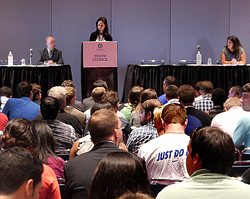
This drop appeared even more dramatic at the Democratic National Convention. Due to the overwhelming youth support of President Obama in 2008, we expected to find hundreds of engaged youth in the convention halls. Indeed, the DNC boasts a Youth Council, which had two meetings and held two Youth Press Conferences. However, adults outnumbered the youth by a sizable margin at all of these events. It doesn’t help that the DNC defines youth as age 36 and under.
Roland Martin, political analyst at CNN and author of Speak, Brother! A Black Man's View of America and The First: President Barack Obama's Road to the White House, among other works, took time to discuss this significant change.
"Obviously, you have some disenchantment comparing the 2008 to 2012 election because a lot of young folks expected more. But the thing that I think is important is for folks to understand that you can't look at one election and somehow think, 'Okay, that’s it, I'm checking out,’” he said. “The key for any young person is that they need to understand not to get focused on what one politician is doing, not what one party doing, but how they can actually drive a movement with their involvement."
This made a lot of sense to me. Instead of the youth looking at the politicians they elect to make the change, they need to step in themselves. Instead of being resigned when change is not immediate, they should set out to attain the action they seek. Unless the voices of youth are heard loud and strong, change will not occur because politicians assume there is no call for it.
There is still time for youth to recover their momentum, Martin said. "They got to stay in the game. At some point, the young folks will have to say, 'You know what? This is on us.'”
In the two months left until the election, youth should go out and transform from the game players they are to the game changers they can be.
To get a youth perspective on the 2012 Presidential Elections, WKCD has teamed up with the youth-led news bureau, Y-Press, based in Indianapolis. Originally part of the Children’s Express, Y-Press has nurtured young journalists for more than 20 years. Their stories and articles—on local, national, and global topics—appear every other week in the Indianapolis Star. The Y-Press web site is updated regularly and encourages external submissions and comments about youth-written stories and reviews.
Here, Y-Press reporters will be posting: stories about the campaign, the candidates, and youth perspectives on the political process profiles and interviews with young political activists results from surveys they’ve created to gather information from youth nationwide about the candidates and the issues most important to young people reports from the floor at both of this summer’s national conventions. Check back often to keep up with this special “youth beat” on Election 2012.




